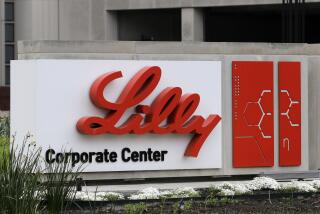Pain Drugs May Thwart Alzheimer’s
- Share via
WASHINGTON — Long-term use of ibuprofen, naproxen or other medicines of a type commonly taken for arthritis or pain appears to greatly reduce the risk of developing Alzheimer’s disease, according to new findings.
In a seven-year study that monitored the mental capacities of 6,989 people older than 54, Dutch researchers reported that the likelihood of developing the brain disease was 80% lower in people who had taken such a medicine daily for two years or longer than in those who had never taken the drugs.
The drugs, known as NSAIDs or nonsteroidal anti-inflammatory drugs, are widely prescribed for arthritis, and three are also approved as nonprescription remedies for fever, headache and pain. Experts warned that people should not take NSAIDs to prevent Alzheimer’s without consulting their physicians. The drugs can cause life-threatening bleeding from the stomach or intestines, and the risk of that occurring is especially high in the elderly.
The Dutch study is not the first to suggest that NSAIDs reduce the risk of Alzheimer’s disease. However, experts said its findings are particularly persuasive because it is one of the largest and best designed studies on the subject.
The results also suggest that NSAID use may not be beneficial once symptoms of Alzheimer’s have begun or within the two years preceding their appearance. Statistical analysis of the data indicates that the drugs may have to be taken earlier if they are to help prevent insidious damage to the brain.
“I think it’s quite plausible that if they protect, the earlier you start using them, the better it is,” said Bruno Stricker of Rotterdam’s Erasmus Medical Center, senior author of the study, which appears in today’s issue of the New England Journal of Medicine.
Nevertheless, he added, “I would like to caution the elderly not to switch to these drugs . . . before the usefulness of these drugs in [preventing] Alzheimer’s disease has really been proven.”
The study was not designed to compare individual drugs. Sixteen NSAIDs were used, with diclofenac, ibuprofen and naproxen accounting for 83% of prescriptions.






